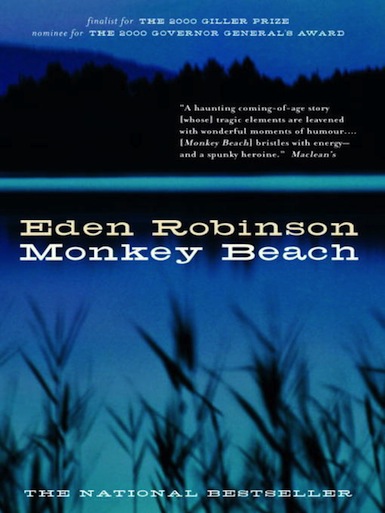'Monkey Beach' Grapples With Issues Of Spirituality, Oppression And Growing Up
By Jaclyn Bauer in Arts & Entertainment on Sep 25, 2014 8:30PM
 Eden Robinson’s Monkey Beach, the 2001 recipient of the Ethel Wilson Prize, was released as an eBook for the first time last month. Monkey Beach is a coming of age tale that is told in a reel of flashbacks, memories and dreams. A novel of oppression, loss of innocence and spirituality, Robinson’s themes pervade the pages of Monkey Beach with a unique perspicuity.
Eden Robinson’s Monkey Beach, the 2001 recipient of the Ethel Wilson Prize, was released as an eBook for the first time last month. Monkey Beach is a coming of age tale that is told in a reel of flashbacks, memories and dreams. A novel of oppression, loss of innocence and spirituality, Robinson’s themes pervade the pages of Monkey Beach with a unique perspicuity.
The book’s main character, Lisamarie Michelle Hill, is a part of a Haisla (or indigenous) tribe and lives with her family on a reservation in Kitamaat, British Columbia. She begins her story at twenty years old as she’s chain smoking cigarettes in her parent’s kitchen. When we meet the Hill family, they are in shambles over the disappearance of Lisa’s younger brother, Jimmy, who is lost at sea.
Within a few pages, we are thrown into one of Lisa’s most distinct memories of her childhood. In the memory, Lisa details how her and Jimmy convinced their parents to take them to Monkey Beach in search of B’gwus, or the Haisla’s equivalent of Big Foot. Lisa tells how she came face to face with the creature in this first dose of magical realism that Robinson administers to us. At first, it’s hard to discern what this means for a seemingly ordinary novel, as Lisa admits that she’s not sure if she imagined the whole interaction or not.
We are further propelled into Lisa’s memories where we happen to meet all of the book’s characters. The most important people in Lisa’s life are strong-willed and spirited, including her Uncle Mick. We learn that Uncle Mick was missing for years, and was thought to be dead, before he turned up on the Hill doorstep when Lisa was a child. Lisa emulates her uncle’s behavior, following in his image as a strong and opinionated young woman. In one scene from her past, Lisa sings “Fuck the Oppressors” (a song Mick and his friends wrote) in the middle of class after her teacher asks her to read a passage about cannibalism among native cultures. Lisa’s self-sufficiency and strength of character later takes on new forms of darkness as she ages and applies her behavior to more drastic experiences.
Throughout the novel, Lisa encounters demons, ghosts and visions both literal and figurative. Robinson has a way of conjuring the most unthinkable situations and the most radical perversions of reality and making them somehow tangibly, believably and seamlessly interwoven in an otherwise everyday coming of age story.
Though Lisa experiences some out of the ordinary tragedies and spectacular spiritual encounters, her story is still that of a young girl facing the arduous task of growing up. Despite the fact that the paths of narration tend to amble and it is easy to get lost in them, Robinson is able to tie together every loose end while still leaving readers with a sense of wonder and intrigue. A joy, a horror and an utterly heart wrenching book, Monkey Beach is worth every painstaking turn.
Even over a decade later, the themes of Monkey Beach are pertinent for people of all ages, nationalities and beliefs. Now in eBook form, hopefully Monkey Beach will be able to reach an even wider audience and continue to spread awareness and stir the emotions of its readers.